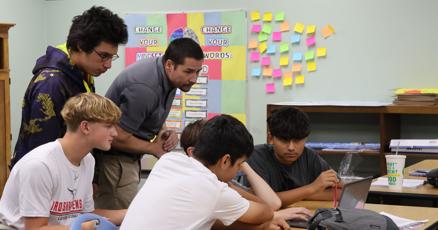Rural Economic Divide: The True Cost of College vs. Career Choices
Rural communities face a complex economic choice as $50,000 entry-level jobs compete with college education paths, revealing deeper questions about the future of rural development and education.

Students at Kimball County High School discussing career options with their career specialist teacher
The Economic Reality Reshaping Rural Education Choices
In rural Nebraska, a striking economic paradox is unfolding that mirrors broader challenges facing rural communities worldwide. While entry-level positions at companies like Clean Harbors offer $50,000 starting salaries without requiring a degree, the percentage of college graduates in rural counties continues to decline - highlighting complex questions about education, economic mobility, and community sustainability.
The Shifting Value Proposition of Higher Education
Much like recent trends affecting employment markets globally, rural Nebraska is experiencing a transformation in how young people view educational investment. The rising cost of college tuition, which has doubled over the past 20 years, has made many question the traditional college pathway.
"We don't want students to go to college just to say they're in college without a plan," says Danielle Reader, principal at Kimball County High School.
Financial Literacy and Career Planning
The importance of financial education and career planning has never been more critical. Similar to how financial institutions are working to educate young people about fiscal responsibility, rural schools are now focusing on comprehensive career guidance rather than pushing all students toward college.
Economic Implications for Rural Communities
The economic landscape of rural areas continues to evolve, with implications for both individual career choices and community development. As economic policies shift to address regional development challenges, rural communities face unique obstacles in maintaining skilled workforce populations.
Key Challenges:
- Limited access to higher education institutions within reasonable commuting distance
- Rising college costs and potential student debt burden
- Immediate availability of well-paying trade and technical jobs
- Restricted professional opportunities for degree holders in rural areas
Looking Forward: Balancing Education and Economic Growth
The solution may lie in developing more flexible educational pathways that combine traditional college education with practical skills training, while simultaneously working to diversify rural economies to create more opportunities for graduates who wish to return home.
Ella Thompson
Ella Thompson is a Wellington-based journalist covering politics, climate policy, and digital freedoms in the Pacific. With a background in law and international relations, she brings sharp analysis and a passion for civic accountability.
